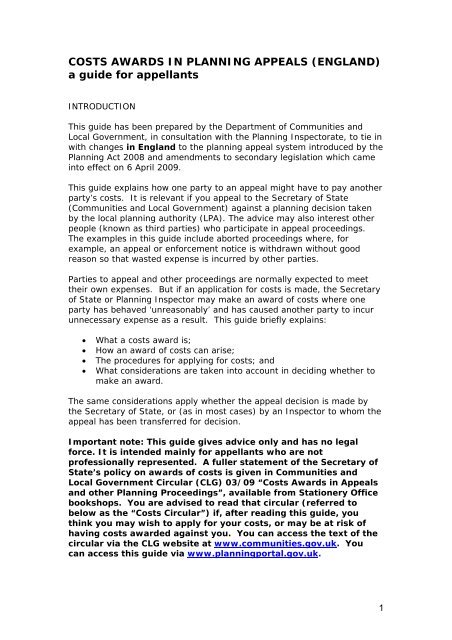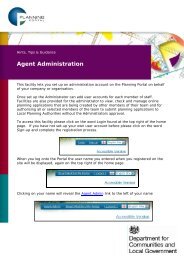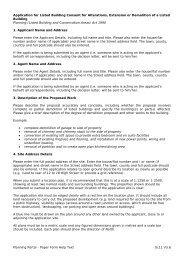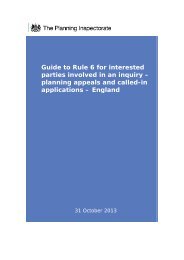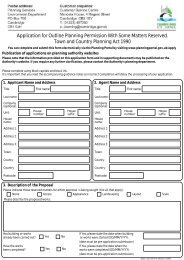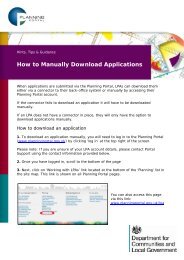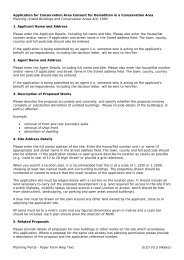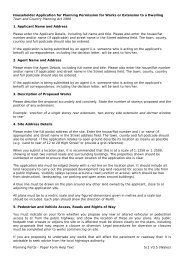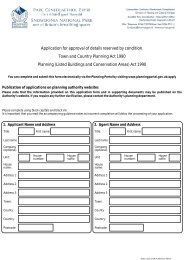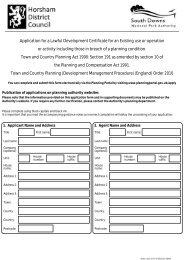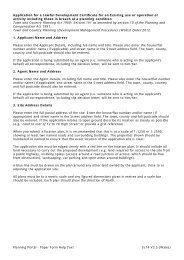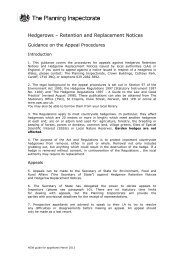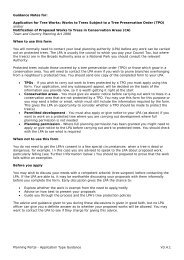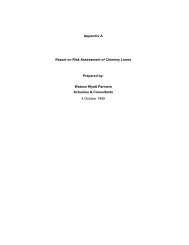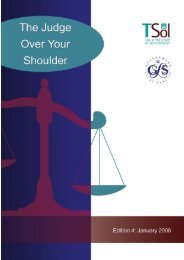COSTS AWARDS IN PLANNING APPEALS ... - Planning Portal
COSTS AWARDS IN PLANNING APPEALS ... - Planning Portal
COSTS AWARDS IN PLANNING APPEALS ... - Planning Portal
You also want an ePaper? Increase the reach of your titles
YUMPU automatically turns print PDFs into web optimized ePapers that Google loves.
<strong>COSTS</strong> <strong>AWARDS</strong> <strong>IN</strong> PLANN<strong>IN</strong>G <strong>APPEALS</strong> (ENGLAND)a guide for appellants<strong>IN</strong>TRODUCTIONThis guide has been prepared by the Department of Communities andLocal Government, in consultation with the <strong>Planning</strong> Inspectorate, to tie inwith changes in England to the planning appeal system introduced by the<strong>Planning</strong> Act 2008 and amendments to secondary legislation which cameinto effect on 6 April 2009.This guide explains how one party to an appeal might have to pay anotherparty’s costs. It is relevant if you appeal to the Secretary of State(Communities and Local Government) against a planning decision takenby the local planning authority (LPA). The advice may also interest otherpeople (known as third parties) who participate in appeal proceedings.The examples in this guide include aborted proceedings where, forexample, an appeal or enforcement notice is withdrawn without goodreason so that wasted expense is incurred by other parties.Parties to appeal and other proceedings are normally expected to meettheir own expenses. But if an application for costs is made, the Secretaryof State or <strong>Planning</strong> Inspector may make an award of costs where oneparty has behaved ‘unreasonably’ and has caused another party to incurunnecessary expense as a result. This guide briefly explains:• What a costs award is;• How an award of costs can arise;• The procedures for applying for costs; and• What considerations are taken into account in deciding whether tomake an award.The same considerations apply whether the appeal decision is made bythe Secretary of State, or (as in most cases) by an Inspector to whom theappeal has been transferred for decision.Important note: This guide gives advice only and has no legalforce. It is intended mainly for appellants who are notprofessionally represented. A fuller statement of the Secretary ofState’s policy on awards of costs is given in Communities andLocal Government Circular (CLG) 03/09 “Costs Awards in Appealsand other <strong>Planning</strong> Proceedings”, available from Stationery Officebookshops. You are advised to read that circular (referred tobelow as the “Costs Circular”) if, after reading this guide, youthink you may wish to apply for your costs, or may be at risk ofhaving costs awarded against you. You can access the text of thecircular via the CLG website at www.communities.gov.uk. Youcan access this guide via www.planningportal.gov.uk.1
Q1 What is a costs award?The parties in an appeal normally meet their own expenses. A costsaward, where justified, is an order which can be enforced in the Courts. Itstates that one party shall pay to another party the costs, in full or part,which have been incurred during the process for reaching the Inspector’sor Secretary of State’s decision on the appeal.Q2 Who can apply for costs?As stated above, the parties in an appeal normally meet their own expenses.Either of the main parties – the appellant or the LPA – can apply for costs ifthey consider the other party has behaved ‘unreasonably’. Any interestedthird parties in an appeal (see Q12 below) can also apply for costs if, forexample, a hearing or inquiry is cancelled, as a result of ‘unreasonable’behaviour by the appellant or the LPA.Q3 In what cases can I apply for my costs or have costs awardedagainst me?Costs can be awarded in many different cases – appeals and other typesof proceedings under the <strong>Planning</strong> Acts. For simplicity, this guide refers to‘appeals’ and ‘appellants’. From 6 April 2009 there is a “level playingfield” which means that costs can be awarded for all appeals andproceedings 1 under the <strong>Planning</strong> Acts irrespective of theprocedure for deciding the appeal – whether writtenrepresentations, a hearing or an inquiry. Awards can be made to oragainst the appellant or LPA concerned. Full guidance is in CLG Circular03/09, referred to in the introduction.The most common cases are appeals against the LPA’s refusal of planningpermission and issue of an enforcement notice. Costs awards are alsoavailable in other appeals under the <strong>Planning</strong> Acts; and also in someinquiry and hearing proceedings under other legislation.Costs awards are also available in compulsory purchase order (CPO)cases, but on a different basis. This is explained in the CLG booklet 1 ofthe ‘Compulsory Purchase and Compensation’ series, entitled ‘CompulsoryPurchase Procedure’. It is obtainable from CLG Free Literature,PO Box 236, Wetherby, West Yorkshire, LS23 7NB, telephone 0870 1226236. A fuller statement is in CLG Circular 03/09, referred to above.Q4 Does the ‘loser’ in an appeal normally have to pay the otherparty’s costs?No. Costs awards do not depend on the result of the appeal. They areawarded only where there has been ‘unreasonable’ behaviour by the partyclaimed against. You will not automatically be awarded costs against the1 Except for proceedings under section 259 of the Town and Country <strong>Planning</strong> Act 1990concerning orders relating to public rights of way affected by development, where theproceedings are dealt with by written representations2
LPA if your appeal succeeds. Nor will costs be awarded against you justbecause your appeal fails.Q5 When will costs be awarded?An award of costs is always at the Inspector’s or Secretary of State’sdiscretion. But he/she would normally make an award if:(i)(ii)(iii)one of the parties has applied for costs at the appropriate stage(see Q15 below) anda party has behaved ‘unreasonably’; andthis ‘unreasonable’ behaviour has caused the applicant for costs toincur or waste expense unnecessarily.All 3 conditions need to be met.Q6 What is unreasonable behaviour?Behaviour which has led directly to an unnecessary appeal to theSecretary of State might be considered unreasonable. For instance, theLPA might be unable to produce evidence to support each of their reasonsfor refusing planning permission, or for imposing a condition on a grant ofplanning permission. Alternatively, an appellant may pursue an appeal fora proposal which was plainly a ‘no-hoper, with no reasonable prospect ofsuccess (see Q7 below).The way in which one party has conducted their part of the proceedingsmight also be considered unreasonable. For instance, through the fault ofone party, the hearing or inquiry has had to be adjourned, orunnecessarily prolonged, or cancelled, resulting in unnecessary or wastedexpense.Unreasonably causing the appeal process to be aborted or causing part ofthe appeal expense to be wasted – irrespective of the procedure beingfollowed – may also lead to an award of costs. Examples are if the LPAwithdraw one or more of their reasons for refusing planning permission, orissuing an enforcement notice, or if they concede a ground of appeal afterthe appeal has been made, without good reason; or if the appellantwithdraws the appeal (or ground of appeal), but cannot show that therehas been a material change of circumstances since the appeal was firstmade.Another example is if the appellant fails to attend, or be represented at, ahearing or inquiry, without good reason. Or if a party fails to attend anaccompanied site visit arranged by the <strong>Planning</strong> Inspectorate, so that theother party’s expense of attending is wasted. Other examples ofunreasonable behaviour which may justify an award of costs are given inCLG Circular 03/09.3
Q7 Could I have costs awarded against me for pursuing an appealwhich had no reasonable prospect of success?Yes. If, for instance, the Secretary of State (or an Inspector) had recentlydismissed an appeal for the same or very similar development, on thesame land, nothing had changed since and there was clearly no prospectof the further appeal being successful. Or the appeal may be one which isclearly contrary to national planning policies. In such a case the LPA willhave stronger grounds for seeking an award of costs if they can show thatthey alerted you to the relevant facts and warned you they would seektheir costs if you persisted with your appeal.Q8 Can costs be awarded against me if I decide not to proceedwith my appeal?Yes. You should be ready to proceed with an appeal once it is submitted.You are at risk of an award of costs for withdrawing an appeal atany stage if an application for costs is made. The Secretary of State willthen carefully consider the reasons for your decision to withdraw, whichyou will be invited to state in writing. An award of costs is unlikely to bemade if you can show good reason for withdrawing when you did – forexample, if the LPA have granted planning permission, with conditions ornot, for the same development; or if there has been some other relevantand material change since you appealed.If you do decide to withdraw your appeal, or any of the grounds of theappeal (for example, in an enforcement notice appeal), you should notifythe <strong>Planning</strong> Inspectorate immediately, by email, fax or letter to the CaseOfficer, quoting the appeal reference number. Acting at the earliestopportunity will minimise the wasted expense incurred by other parties.Q9 Can costs be awarded against me if I am not professionallyrepresented?Yes. Wilfully un-cooperative behaviour by any party, whether or notprofessionally represented, may result in an award of costs. Examples ofsuch behaviour include a refusal to supply a timely and adequatestatement of the grounds of appeal when asked to do so, or refusal todiscuss the appeal with the LPA before the hearing or inquiry to narrowareas of dispute. Failure to notify the <strong>Planning</strong> Inspectorate of a changeof address may be unreasonable if this leads to unnecessary attendanceat the hearing or inquiry or site visit by another party.Where technical issues of planning or legal precedent or procedure arise, theSecretary of State, in judging whether behaviour was unreasonable, wouldconsider the professional advice obtained by the party in question – and alsoany warning given by the local planning authority (see Q7).4
Q10 Can I have costs awarded against me when a hearing orinquiry is held, even though I have opted for the written methodand not asked for a hearing or an inquiry?Yes. Costs can be awarded irrespective of the appeal method or procedure(see Q3). The <strong>Planning</strong> Inspectorate on behalf of the Secretary of Statewill choose the most appropriate method by applying published criteriaapproved by Ministers. If the <strong>Planning</strong> Inspectorate considers a hearing orinquiry to be necessary to determine your appeal, although you haveopted for the written procedure, the reasons for this will be explained. Ifyou unreasonably cause a cancellation, or otherwise behave unreasonablyin the proceedings, an award of costs can be madeQ11 Will an application for my costs affect the decision on myappeal?No. Appeals are decided entirely on their facts and planning merits. Thedecision will not be affected in any way by the submission of a costsapplication. A decision whether to award costs is an entirely separate matter.Q12 What about third parties?Generally speaking, parties other than the appellant and the LPA whoappear at an inquiry (or hearing) – neighbours, for example, or localamenity societies – will rarely be involved in claims for costs. If thirdparties choose to participate in appeal proceedings, they do so on theirown initiative. For example, they may wish to appear at an inquiry (orhearing), in support of the LPA’s refusal of planning permission. Only inexceptional circumstances – for instance, where an inquiry has to beadjourned unnecessarily or a site visit has to be rearranged because ofthe unreasonable behaviour of a third party or of another party – will thirdparties have any grounds for claiming costs, or be likely to face claimsagainst them.Q13 How might a third party be awarded their costs?Third parties may be awarded costs, in their favour, when an inquiry (orhearing) is adjourned or cancelled. An award may be made in thefollowing circumstances:(i) where unreasonable conduct by the appellant or the LPAcauses the adjournment or cancellation of an inquiry (or hearing) orof an accompanied site visit in which a third party has expressed aninterest; or(ii) where an appellant withdraws the appeal too late for theinquiry (or hearing) to be cancelled, or fails to attend an inquiry (orhearing) or accompanied site visit.When this happens, third parties are unlikely to have grounds for claimingcosts for wasted preparation work (in addition to their attendance costs)5
unless they can show that, before incurring any expense, they forewarnedthe appellant and the LPA that they intended to appear at the inquiry (orhearing). For inquiries they can do this by contacting the <strong>Planning</strong>Inspectorate at an early stage and seeking “Rule 6” status (under therelevant Inquiries Procedure Rules). They should also have first enquiredof the LPA whether the appellant was trying to resolve differences overthe appeal issues by discussion with them.Q14 How might a third party have costs awarded against them?Generally, third parties such as local residents who attend an appeal inquiryor hearing, having perhaps written to the LPA at application stage, are mostunlikely to be at any risk. Persons who take responsibility for their behaviourand act reasonably will not be at risk of an award of costs. Where a thirdparty is “entitled to appear at an inquiry” or has stated a wish to give evidenceat a hearing, they will be expected to behave appropriately – for example, bycomplying with the normal procedural requirements concerning the timelysubmission of statements of case. They will be at risk for any unreasonableconduct relating to procedural matters which causes unnecessary or wastedexpense to other parties.Q15 How and when should I apply for costs?There is no formal procedure or required application form. But a templatewhich can be used to apply for costs in written appeals, or provideadvance notice in hearings and inquiry cases, is at the end of this guide.Your application should explain why you consider the other party hasacted unreasonably, and how this has caused you to incur unnecessary orwasted expense.For hearings and inquiriesIf before the hearing or inquiry you clearly see grounds for an award ofcosts and know you intend to apply for costs you can and should giveadvance notice of this. Written applications disclosed to the other party inadvance are good practice and can save valuable time in hearing oralsubmissions. You should:• provide the case officer with an advance statement of your groundsor written skeleton argument; and• send a copy of this to the other party so that your intention is clearand open.The case officer will then write to the other party and invite a response.This will be copied to you for any final comment before the hearing orinquiry opens.At the hearing or inquiry either party can respond to what happens on theday and amend or add to submissions already made by putting them tothe Inspector when the application is dealt with.6
If you decide to apply for costs because of what has happened “on theday” you can apply orally directly to the Inspector.The Inspector will provide opportunity for a costs application and responsebefore the event is closed or adjourned for any site inspection. Pleasenote that an application for costs has to be made by this deadlineto be accepted as timely (see also Q16). The party applying for costswill be able to make the application or expand on any submissions alreadymade or add further grounds, while the other party will be given anopportunity to respond before the applicant has the “final say”.For written appeals in general, excluding householder and treepreservation order appealsAny grounds for a costs application should normally be clear by the timeyou have received the other party’s statement of case 2 , if not before –and at the latest when written exchanges are completed 3 . So you shouldmake any costs application within this time-limit. Please note: it is notenough to submit a vaguely worded application or to merely say youintend to make an application for costs.Householder appeals are a category of written appeal, on which there isspecific guidance in the Inspectorate’s Guide to the Householder AppealsService. You can access this guide via www.planningportal.gov.ukIn accordance with the “expedited” 4 or quicker procedures for householderappeals which are identified and accepted for treatment in this way, youshould normally be clear from the outset whether you have any realisticbasis for applying for costs. You should make any application for costs atthe same time as submitting the appeal, supported by a full statement ofwhy you consider an award justified. Please note that the fact thatplanning permission has been refused will not, in itself, be an adequatebasis for alleging unreasonable behaviour by the LPA. Furthermore, it willbe necessary to show that unnecessary or wasted expense has beenincurred as a direct result of the unreasonable behaviour to justify anaward of costs being made in your favour.You will need to show that the LPA’s decision was unreasonably made onthe basis of the information provided and available to it at the time. Thereduced timescales and minimal procedural requirements for theseappeals which are dealt with by the quicker procedures mean that thepossibility of unreasonable behaviour during the appeal process isminimised. Therefore, any application for costs is likely to concern thesubstance of the case and, as stated above, should be made at the sametime as the appeal.2 Due 6 weeks after the appeal start date3 Due 9 weeks after the appeal start date4 Under Part 1 of The Town and Country <strong>Planning</strong> (Appeals) (Written RepresentationsProcedure) (England) Regulations 2009 (2009/452)7
If it is agreed that your appeal should be dealt with under the quickerprocedures any application for costs should be made within 5 days of thestart date notified by the <strong>Planning</strong> Inspectorate, if not made at the sametime as the appeal.Tree preservation order (TPO) “fast-track” appeals. Theprocedures for these cases are set out in Communities and LocalGovernment’s publication Tree Preservation Orders – A Guide to the Lawand Good Practice. If you have not opted for an oral hearing, and theappeal proceeds by the written “fast-track” method, any application forcosts should normally be made at the same time as the appeal,supported by a full statement on why an award is considered justified.You will need to show that the LPA’s decision was unreasonably made onthe information available to them at the time and that as a result youhave incurred unnecessary or wasted expense.For a cancelled hearing or inquiry or aborted written appeal (see Q6)In a cancelled hearing or inquiry or aborted written appeal an applicationfor costs should be submitted no later than 4 weeks from the date of thenotice of cancellation or withdrawal. The address to write to is at the backof this guide.Q16 Does this mean that an application for costs cannot beconsidered if it is submitted later?Generally yes. An application for costs will be considered late if it ismade:• after the hearing or inquiry is closed• later than 4 weeks after receiving notice of a cancellation of ahearing or inquiry• later than 4 weeks after receiving notice of withdrawal in a writtenappeal• after the Inspectorate’s deadline for final comments at 9 weeks orafter the site visit 5 in appeals dealt with in writing, other thanhouseholder appeals dealt with via the quicker procedure• later than 5 days after the start date notified by the <strong>Planning</strong>Inspectorate in the case of a householder appeal that proceeds viathe quicker procedure – where the application for costs is made bythe appellant• after the notice of appeal in the case of a TPO appeal whichproceeds by the written “fast-track” procedure or• after the completed questionnaire has been submitted in the case ofa TPO appeal that proceeds via the written “fast-track” procedure –where the costs application is made by the LPA.A late application will only be accepted if the party can show good reasonfor not having applied sooner. A “good reason” will not be, simply,5 Unless the claim concerns conduct relating to the site visit itself in which case it should bemade immediately afterwards and no later than within 7 days of the site visit8
that you have won your appeal and therefore wish to recover yourcosts. The address to write to is stated at the back of this guide. If alate costs application is accepted, the <strong>Planning</strong> Inspectorate will notify theparties and arrange an exchange of written submissions before thedecision on it is issued.Q17 If an application for costs is made against me in a writtenappeal, including a TPO “fast-track” appeal, will I be able tocomment and have my comments taken into account?Yes. In that case you will be sent a copy of the costs application andinvited to comment within a set timescale. Comments will be exchangedand taken into account before the decision on the application is issued. Ina householder service appeal or “fast-track” TPO appeal any costsapplication, and written exchanges, will be dealt with at the end of theappeal process.Q18 If my application for costs succeeds, will all my appealexpenses be paid?No. The amount of costs will depend on what unnecessary or wastedexpense you have incurred in relation to the hearing or inquiry or writtenappeal. For example, you might be awarded costs because the localplanning authority failed to produce any evidence to substantiate only oneof several reasons they gave for refusing planning permission. Youraward would then be limited to the costs of contesting that reason.Similarly, where an unnecessary adjournment of the inquiry is caused bythe unreasonable conduct of one of the parties, the award of costs will belimited to the extra costs incurred by the other party as a result of theadjournment. Where the application succeeds, the decision will state theextent to which costs are awarded to the successful party.Q19 When will a decision be given on the costs application?Normally, the costs decision will be given at the same time as the appealdecision in a hearing or inquiry case. In written cases, the costs decisionmay follow after the appeal decision - in the case of a householder serviceor TPO “fast-track” appeal the decision is likely to follow after theInspector’s appeal decision because of the priority given to “fast-tracking”the appeal outcome.Q20 Will the Secretary of State decide the actual amount of theaward?No. The party awarded costs should first submit details of their costs tothe other party, with a view to reaching agreement on the amount. If theycannot agree, the party awarded costs can refer the case to a CostsOfficer or Costs Judge of the Supreme Court Costs Office for a separatedecision. The procedure for resolving these disputes is explained in theAppendix.9
Q21 Can a decision on the costs application be challenged in theCourts?Yes. If a decision is legally defective or if the requirements of naturaljustice have not been met. There is no specific statutory provision forchallenge. The procedure is to apply to the High Court for permission tohave the decision judicially reviewed. This should be done promptly and,in any event, within 3 months of the date of decision. Anyone consideringsuch a course would be well advised to seek professional legal advice onwhat would be involved.10
THE PLANN<strong>IN</strong>G <strong>IN</strong>SPECTORATEAppendix 1AWARD OF APPEAL <strong>COSTS</strong>:LOCAL GOVERNMENT ACT 1972 – SECTION 250(5)HOW TO APPLY FOR A DETAILED AND <strong>IN</strong>DEPENDENT ASSESSMENTWHEN THE AMOUNT OF AN AWARD OF <strong>COSTS</strong> IS DISPUTED.This note is for general guidance only. If you are in any doubt about howto proceed in a particular case, you should seek professional advice.If the parties cannot agree on the amount of costs to be recovered, eitherparty can refer the disputed costs to a Costs Officer or Costs Judge fordetailed assessment 1 . This is handled by:The Supreme Court Costs OfficeClifford’s InnFetter LaneLondonEC4A 1DQTel: 020 7947 7124But before this can happen you must arrange to have the costs awardmade what is called an order of the High Court 2 . This is done by writingto:The Administrative Court OfficeRoyal Courts of JusticeStrandLondonWC2A 2LL.You should refer to section 250(5) of the Local Government Act 1972, andenclose the original of the order of the Secretary of State, or hisInspector, awarding costs. A prepaid return envelope should be enclosed.The High Court order will be returned with guidance about the next stepsto be taken in the detailed assessment process.________________1 The detailed assessment process is governed by Part 47 of the CivilProcedure Rules that came into effect on 26 April1999. You can buy theseRules from Stationery Office bookshops (formerly HMSO) or look at copiesin your local library or council offices.2 Please note that no interest can be claimed on the costs claimed unlessand until a High Court order has been made. Interest will only be runfrom the date of that order.11
The address to contact about this guide or for more information aboutmaking an application for costs is:The <strong>Planning</strong> Inspectorate5/03 Kite WingTemple Quay House2 The SquareTemple QuayBRISTOLBSI 6PNTel 0117 372 8594 (England only)The <strong>Planning</strong> Inspectorate’s website is:www.planning-inspectorate.gov.uk12
Appendix 2Date Received (Officialuse)The <strong>Planning</strong> InspectorateApplication for an award of appeal costsYou can use this form as a template if you wish to apply for costs in:-• a written appeal• an appeal going to a hearing or inquiry, but you wish to giveadvance notice of an application for costs• an appeal which is withdrawn (or where the enforcement notice iswithdrawn).Notes to help you are in part D------------------------------------------------------------------------------A Information about the claimantFull name:………………………………………………………………………………………………………Address:……………………………………………………………………………………………………………………………………………………………………………………………………………………………………………………………………………………………………………………………………………………………..Postcode:…………………….Daytime telephone No:……………………Your reference…………………..…………….Fax no:………………………………………….Email address: ……..…………………………………………………………..………………………….Status (Appellant/Local <strong>Planning</strong> Authority/Interested Party):…………………………………………………………………………………………………………………………------------------------------------------------------------------------------Agent’s Name (if applicable):……….…………………………………………………………......Agent’s Address:…….……………………………………………………………………………………..………………………………………………………………………………………………………………………..…………………………………………………………………………………………………………………………Postcode:…………………….Daytime telephone No:……………………Reference…………………..……………..…….Fax no:………………………………………….Email address: ……..…………………………………………………………..………………………….------------------------------------------------------------------------------13
BInformation about the party being claimed againstFull name:………………………………………………………………………………………………………Address:……………………………………………………………………………………………………………………………………………………………………………………………………………………………………………………………………………………………………………………………………………………………..Postcode:…………………….Status (Appellant/Local <strong>Planning</strong> Authority/Interested Party):…………………………………………………………………………………………………………………………------------------------------------------------------------------------------C Information about the appeal<strong>Planning</strong> Inspectorate appeal reference number APP/………………………………….(Please quote all appeal reference numbers if the costs applicationrelates to more than one appeal)Name of Local <strong>Planning</strong> Authority:…………………………………………………………………Description of the development:.............………………………………………..……….…………………………………………………………………………………………………………………………..………………………………………………………………………………………………………………………..Address of the site………………………………………………………………………………………….…………………………………………………………………………………………………………………………………………………………………………………………………………………….-------------------------------------------------------------------------------------------------------D Notes for guidance on your costs application – please readbefore going aheadAppellants, local planning authorities and anyone else involved with theappeal (the parties) are normally expected to cover their own expenses.But anyone involved in the appeal can ask the Secretary of State orappointed Inspector to order that one party pays some or all of anotherparty’s costs. Before agreeing to this, we will have to be sure that:• the person applying was put to unnecessary or wasted expense inthe appeal• because of the unreasonable behaviour of the other party.An award can only be made if both these tests are met.14
Please write (in section E) how you think the other party has actedunreasonably and what expense this has caused you. Please note thatonly the unnecessary or wasted costs of the appeal itself can berecovered by an award.Before going ahead with your application, please read the guide “CostsAwards in <strong>Planning</strong> Appeals” (revised 2009 – England). This can bedownloaded from www.planning portal.gov.uk. You can also get a copyby contacting the Inspectorate’s Customer Service Team on 0117 3726372. We also ask you to read the full statement of national policy in the“Costs Circular” (number CLG 03/09), quoted in the guide. You can accessthis from the Communities and Local Government website atwww.communities.gov.uk or you can look at copies in your local library orlocal planning authority office.Although Q15 of the guide says there is no formal procedure or applicationform, you can use this form as a template to make an application for costsin writing. Please refer to the relevant parts or paragraphs of thecircular which you think support your application.The decision on your application will not go into the actual amount ofcosts involved – only the principle and, if an award is made, what theaward is broadly for. So there is no need to state the actual amounts youare seeking. If an award is made, the parties will need to settle theamounts involved between them by negotiation; or, if that fails, byapplying to the Supreme Court Costs Office for an independent decisionon the matter. There is more advice on this in the costs guide, at Q20.If you are using this form to give advance notice of a costs application in ahearing or inquiry case, please send a copy of your completed applicationto the other party. Q15 of the costs guide gives further information.Please also note there are time limits for making a costsapplication, again depending on the procedure for deciding theappeal. Q15 of the costs guide gives further information.-----------------------------------------------------------------------------------E Your costs applicationPlease state what you think is:• the unreasonable behaviour which has caused you unnecessary orwasted expense in the appeal…………………………………………………………………………………………………………………………………………………………………………………………………………………………………………………………………………………………………………………………………………………………………………………………………………………………………………………………………………………………………………………………………………………………………………………………………………………………………………………………………………………………………………………………………………………………………………………………………………………………………………………………………………………………Continue on a separate sheet if necessary.15
• your unnecessary or wasted expense in the appeal (not the amount,but the kind of expense)…………………………………………………………………………………………………………………………………………………………………………………………………………………………………………………………………………………………………………………………………………………………………………………………………………………………………………………………………………………………………………………………………………………………………………………………………………………………………………………………………………………………………………………………………………………………………………………………………………………………………………………………………………………………………………………………………………………………………………………………………………………………………………………………………………………………………………………………………………………………………………………………………………………………………………………………………………Continue on a separate sheet if necessary.Please sign belowI understand that:(a) use of this form is voluntary, and that the <strong>Planning</strong> Inspectorate mayuse the information I have given for official purposes in connectionwith the processing of my application for an award of costs;(b) the costs decision resulting from processing my application will bepublished on the <strong>Planning</strong> <strong>Portal</strong> and will include relevant names butnot addresses.By signing this form I am agreeing to the above use of the information Ihave provided.I have completed all sections of the form and confirm that details arecorrect to the best of my knowledge. (Please note: signature is notnecessary for electronic submissions)Signature ………………………………………………………………………………On behalf of……………………………………………………………………………Name (in capitals) ..…………………………………………………………………Date..……………………………………….The gathering and subsequent processing of the personal data you give onthis form accords with the terms of the <strong>Planning</strong> Inspectorate’sregistration under the Data Protection Act 1998. More about the <strong>Planning</strong>Inspectorate’s data protection policy can be found on our website at“Privacy Statement”:www.planninginspectorate.gov.uk/pins/terms_conditions/privacy/index.htm16
Please note exceptions below but otherwise send this form andany supporting documents to:The <strong>Planning</strong> InspectorateTemple Quay House2 The SquareTemple QuayBristolBS1 6PNFor the attention of your appeal case officerOr e-mail it to the email address as shown on the letter(s) you havereceived from your appeal case officerExceptions - please note:(1) Householder Appeals ServicePlease ensure your costs application – if you wish to make one - is withyour appeal form when submitting a householder appeal. If you aresubmitting your costs application via the <strong>Planning</strong> Casework Service onthe <strong>Planning</strong> <strong>Portal</strong>, please attach it to the grounds of appeal as aseparate documentIf using post, please send your completed householder appeal form alongwith your costs application, to the address quoted on the appeal form.(2) Tree Preservation Order (TPO) appealsIn the case of a written TPO appeal, any application for costs shouldnormally be made at the same time as the appeal. E-mail to:environment.appeals@pins.gsi.gov.uk or send the form toThe <strong>Planning</strong> InspectorateFor the attention of the Environment TeamRoom 4/04Kite WingTemple Quay House2 The SquareTemple QuayBristolBS1 6PN17


